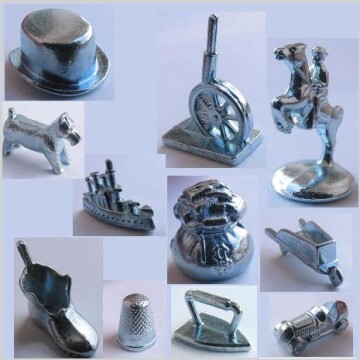Exclusive Possession: Difference between revisions
(Undo revision 39693 by 108.56.51.19 (talk)) |
m (1 revision: Discworld import) |
(No difference)
| |
Revision as of 21:58, 23 September 2012
A boardgame in which up to six players vie for exclusive ownership of the streets, public utilities, coach stations, and major civic landmarks of a city.
The object of the game is not just to win, but to utterly crush your opponents and reduce them to penury and destitution. Which makes it the ideal Hogswatch present for all the family.
In that moment of quantum uncertainty that attends every death (or not death, as the case may be) astute people in full control of their wits, in the throes of a necessary near-Death experience, have challenged Him to a game in order to win their lives back. (Or in the case of certain Witches have put their own lives up as stake money to win life back for another, or just to prove a point about what they really believe in.)
In the case of such stroppy customers, Death always tries to steer them away from chess, as He can never remember which way the little horse-shaped ones are supposed to leap. While he doesn't mind losing at poker against a witch, especially when He secretly knows she's right, Death is now something of an old pro at Exclusive Posession. The best somebody has ever done against Him is apparently all the Utilities and three blocks of streets...
Annotation
This reflects the Roundworld game of Monopoly[1], which is remarkably similar.
The player, in the expanded edition, has the choice from twelve different playing pieces:-
- a wheelbarrow (1937b edition),
- a battleship,
- a sack of money (1999 editions onwards),
- a horse and rider,
- a car,
- a train (Deluxe Edition only, not illustrated above),
- a thimble,
- a cannon (1937b edition),
- an old style shoe (sometimes known as "the boot"),
- a Scottie dog,
- an iron,
- and a top hat.
At least three of these, perhaps four, are used by Moist von Lipwig in Making Money... Of course, there are other players in this game of Exclusive Possession on the Ankh-Morpork board...
The Lavishes certainly have the Sack of Money. Cosmo Lavish has what he believes to be Vetinari's boots. He also has the cannon, in the form of a retained assassin. Pucci Lavish certainly has the coach. (if we accept that a coach is the Discworld analogue of the train/car). Adora Belle Dearheart introduces the horse(of sorts} which she kindly allows Moist to ride when he needs one. She also has an option on the wheelbarrow which is destined to be the foundation of Ankh-Morpork's wealth and the new Gold Standard. The battleship is a motif considered by Owlswick Jenkins as part of the design for higher-denomination paper currency..
Of course, the Lavishes are seeking to rig the game as they have already introduced additional cards into the deck allowing them, and only them, to draw extra undeclared bank dividends - the "bank error" certainly works in their favour and they have collected significantly more than $AM20! Pucci certainly thinks she's entitled to the prize money in every beauty contest going, and, for a Lavish, passing "Go!" means collecting not only their own $AM200, but seeking to deprive the other players of theirs, usually by sending them to jail...
The Chief Cashier might live on The Old Kent Road, a surprisingly down-market address for one of his social standing, but who owns the street and to whom is the rent paid?
And being Banker does not necessarily confer a game-winning advantage, as Moist von Lipwig realises... in fact, it's more of a distraction from the Game.
But only one player controls the "Get Out of Jail Free" cards... and the real boots were on his feet, all along... and speaking of the Patrician, what else is his grand concept of the Undertaking, other than a proposal to establish public utilities and - according to public speculation - some sort of mass-transit system?
What, we wonder, would the Ankh-Morpork Monopoly board look like? There must be one out, or the marketing boys have missed a blindingly obvious tie-in...
